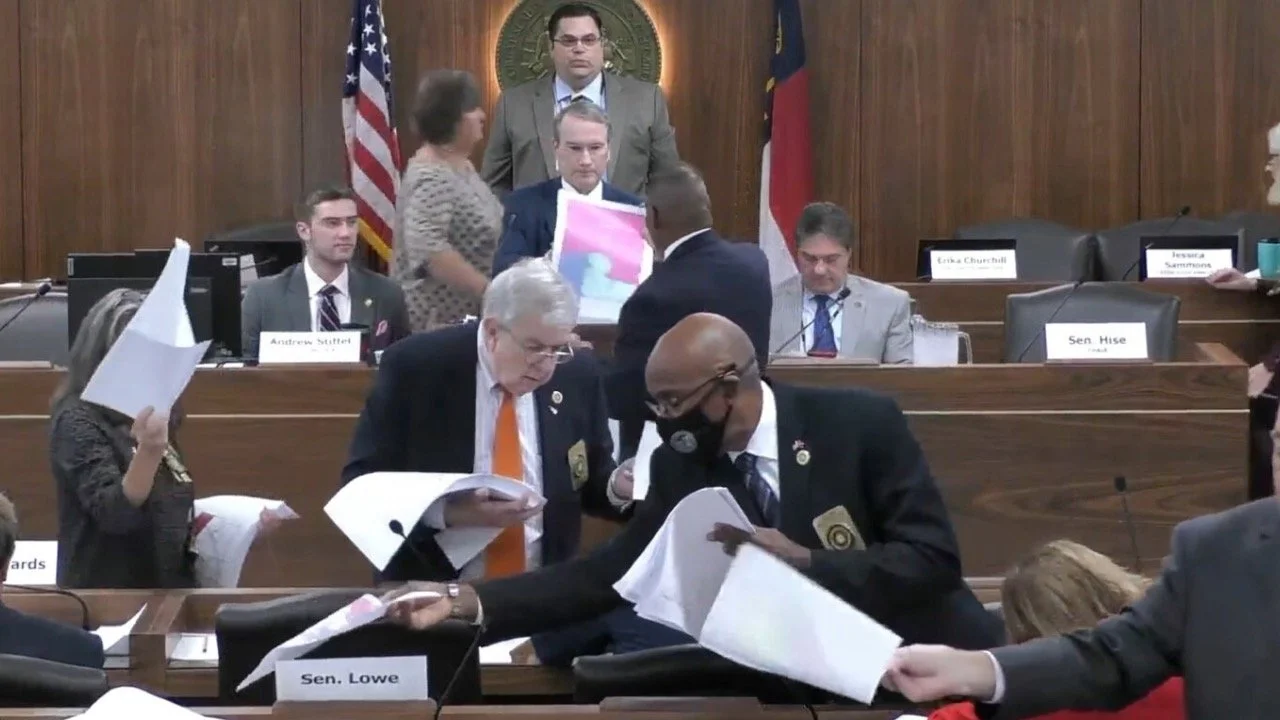Pennsylvania case mirrors N.C. redistricting appeal to U.S. Supreme Court
By Mitch Kokai, Carolina Journal
Based on a 4-3 vote from the state Supreme Court, a congressional election map drawn by legislators gets tossed out. The court substitutes its own map for 2022 elections. The new map tips the scale toward the Democratic Party.
The state in question is not North Carolina. It's Pennsylvania.
Three days after N.C. legislative leaders asked the U.S. Supreme Court to consider a legal dispute involving the Tar Heel State's congressional election map, plaintiffs in the Keystone State followed suit Monday.
The Pennsylvania plaintiffs filed an emergency application for an injunction. They're challenging their state's court-imposed congressional election map.
"Under the U.S. Constitution, 'the Legislature' of each state is charged with prescribing 'the Times, Places, and Manner of holding Elections for Senators and Representatives.'” according to the court filing from Pennsylvania. "Yet on February 23, 2022, the Supreme Court of Pennsylvania ordered state election officials to implement a court-selected map for the state’s 2022 congressional elections, despite the fact that the Pennsylvania Legislature never approved this map nor authorized the state judiciary to participate in the congressional redistricting process."
"The Supreme Court of Pennsylvania also ordered state election officials to disregard the General Primary Calendar enacted by the Pennsylvania Legislature in favor of a court-preferred schedule that delays and compresses the time period in which candidates may circulate and file nomination petitions," the document continued. "The state’s election officials intend to implement this court-selected map and judicially altered calendar for the upcoming primary election, which is scheduled to be held on May 17, 2022."
"But this course of action is flagrantly unconstitutional and should be swiftly enjoined," the plaintiffs argued. "Under the Elections Clause, it is 'the Legislature' — and not the judiciary — that must prescribe 'the Times, Places and Manner of holding Elections for Senators and Representatives,' and the Supreme Court of Pennsylvania has no authority to impose a congressional map unless 'the Legislature' has authorized it to do so."
Emergency U.S. Supreme Court appeals from Pennsylvania head to Justice Samuel Alito. He has called for responses to the Pennsylvania case by the end of the business day Thursday.
That's one day after the 5 p.m. Wednesday deadline Chief Justice John Roberts set for responses to a similar appeal from North Carolina.
On Friday N.C. legislative leaders asked Roberts to block a court-imposed congressional map for the Tar Heel State.
In this case, a 4-3 state Supreme Court tossed out a congressional election map drafted by Republican legislators. Political experts characterized the original map as likely to elect 10 GOP members to the U.S. House of Representatives and four Democrats. Some suggested that the partisan split could be 11-3.
Political scientists and mathematicians working for the map's critics argued that neutral redistricting criteria would be most likely to produce a 9-5 split.
Once the N.C. Supreme Court ordered a redrawn map, the General Assembly responded with a plan emphasizing a larger number of competitive congressional districts. Map supporters called the remedial map a 6-4-4 plan, with six safe Republican seats, four Democratic seats, and four districts likely to swing between the major parties. Results could range from a 10-4 GOP advantage to an 8-6 split favoring Democrats.
A three-judge Superior Court panel overseeing North Carolina's redistricting dispute rejected that remedial map. With input from three outside appointees dubbed "special masters," the panel adopted a map with fewer competitive seats.
The court's map appeared instead to lock in more Democratic election victories. The map has been characterized either as a 7-7 map or a 7-6-1 map, with one true swing district that leans slightly toward Democrats.
The N.C. Supreme Court rejected Republican legislative leaders' appeal to block the trial judges' court-imposed map.
Like the Pennsylvania plaintiffs, North Carolina's Republican legislators are seeking the U.S. Supreme Court's help.
“The federal constitution expressly provides that the manner of federal elections shall ‘be prescribed in each State by the Legislature thereof,'” according to the court filing from North Carolina. “Yet barring this Court’s immediate intervention, elections during the 2022 election cycle for the U.S. House of Representatives in North Carolina will be conducted in a manner prescribed not by the State’s General Assembly but rather by its courts. ‘The Constitution provides that state legislatures’ — not ‘state judges’ — ‘bear primary responsibility for setting election rules,’ … and this Court should intervene to protect the Constitution’s allocation of power over this matter of fundamental importance to our democratic system of government.”
The N.C. and Pennsylvania cases present other similarities. Both states have May 17 primary dates set by the courts. In both states, national Democratic Party election lawyer Marc Elias is working to secure advantages for his fellow partisans. Former Obama administration Attorney General Eric Holder is playing a behind-the-scenes role to benefit Democrats in both states.
The cases present significant differences as well. While N.C. courts imposed a map after labeling the General Assembly's plan unconstitutional, the Pennsylvania court adopted a plan after the governor vetoed legislators' proposal. Failure to enact a map triggered federal laws that could distinguish Pennsylvania's complaint from North Carolina's.
North Carolina gained a new congressional seat because of population growth, Pennsylvania lost a seat.
Yet both states present the U.S. Supreme Court with an opportunity to clarify the law.
"The U.S. Constitution gives state legislatures the exclusive power to establish the 'Times, Places, and Manner of holding Elections for Senators and Representatives.,'” said Jon Guze, senior fellow in legal studies at the John Locke Foundation. "Despite the clarity of that provision, in recent years state courts and administrative agencies, in North Carolina and in other states, have taken it upon themselves to replace election rules and electoral districts that were duly enacted by state legislatures with rules and districts of their own design."
"That kind of overreach doesn’t just violate the Constitution; it also undermines public confidence in the electoral process," Guze added. "The Supreme Court has passed up several opportunities to address the problem in the past, which is a shame. Fortunately, these cases give the court another chance to restore the authority over elections that the Constitution vests in state legislatures."
Candidate filing in North Carolina is scheduled to end Friday. It's unclear how U.S. Supreme Court involvement in the congressional map dispute could affect the state's election schedule.



